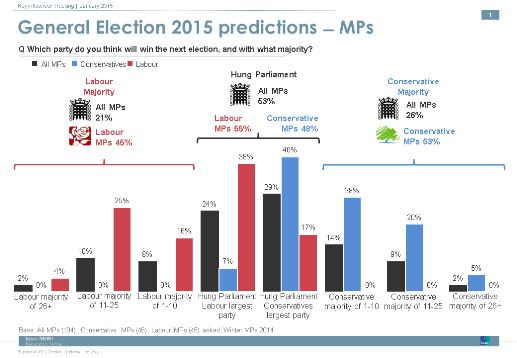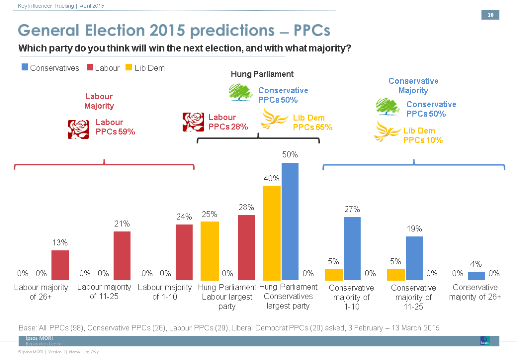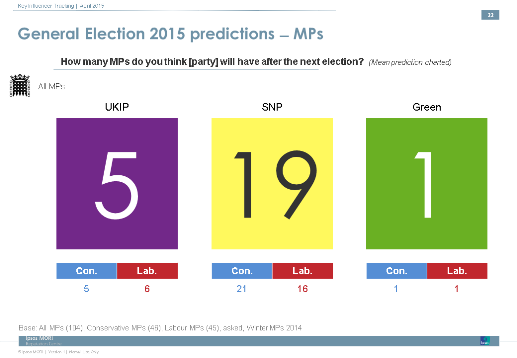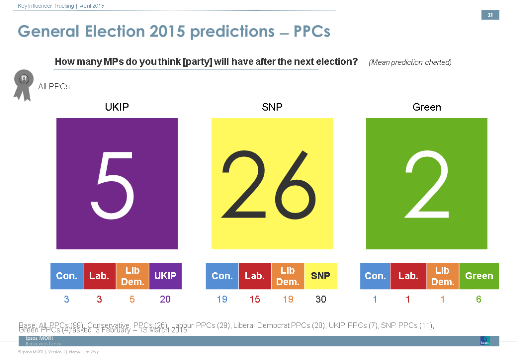The inevitability of coalition? MPs and candidates predict the election

When I tell people I work at Ipsos, one question comes up more than most these days: so who's going to win the election? Somewhat to my chagrin, I have to confess to them that I just don't know. There are too many precedents that could be overturned at this general election. Luckily, my friends usually let me get away with that answer; the question is not so easy to dismiss for those who are running for election.
With all this uncertainty, MPs and prospective parliamentary candidates (PPCs) will be paying close attention to the polls. We asked MPs and PPCs which party they thought would win the next election, and with what majority – we asked MPs in the summer and again before Christmas, and we asked PPCs last month. I see the results as an interesting indication of MPs' and PPCs’ confidence in their own party's performance as the general election draws nearer.
Last summer, MPs were more confident in their party’s ability to win an outright majority: just over a quarter of MPs said that they thought the result of the next election would be a hung parliament. By the winter, that figure had soared to just over half (if they're right, this will be the first time Britain has seen two consecutive hung parliaments since 1910). The largest party, however, is still up for debate, with two fifths of MPs from both the Conservatives and Labour saying that their own party will be the largest party in a hung parliament.

Overall, PPCs agree that a hung parliament is the most likely option. However, since Christmas, Labour have crept back above the Conservatives in our polls. By the time we asked PPCs last month what the result would be, Labour candidates were starting to see space for themselves. A majority of Labour candidates believe that they will contribute to a national swing back to a Labour majority government. Candidates from the two coalition parties, meanwhile, still anticipate that the Conservatives will win more seats than Labour.

The spanner in the works of any outright majority will be the rise of the smaller parties. While UK politics has not been a two-party system for fifty years, this election is seeing the smaller parties making waves in a way that hasn't been seen before. In 1951, the combined Conservative and Labour share of the vote was 97%; in 2010, it was 65%. Our polls are showing an even lower share now. MPs and candidates from all parties are preparing for a House with more colours than has been seen for a long time. Before Christmas, we asked MPs how many seats they expected UKIP, the Scottish National Party and the Green Party to win in the next election, then repeated the question for PPCs last month.


Both groups foresee SNP being the big winners from the swing to smaller parties, with the potential to treble their number of MPs. UKIP is also expected to do well following their recent by-election victories: both MPs and PPCs think they will end up with five MPs come May.
PPCs are generally more likely to think there will be a swing away from the establishment; they expect more SNP MPs and more Green MPs than MPs. Part of this, naturally, is due to candidates from these parties clinging to optimistic hopes: on average, UKIP candidates believe that their party will win 20 seats in the general election, while Green candidates hope to win six. Candidates from the three main parties are more measured in their estimates and more closely match the predictions from MPs before Christmas. Of course, this may just be hopefulness from the old guard who don’t want to lose ground that they’ve always assumed was theirs.
While polls fluctuate, MPs and PPCs up and down the country will have to continue to plan for every possible outcome. Like them, until 7 May, I’ll have to keep professing my uncertainty about the final result.
Ipsos’s Survey of MPs runs biannually in the summer and winter. We interview c.100 MPs face-to-face each wave. Results are weighted to be representative of the house in terms of party and ministerial status. Results in this article are from fieldwork conducted in June/July 2014 and November/December 2014.
Ipsos’s Survey of Prospective Parliamentary Candidates runs in the months before the general election. We interview c.100 candidates for election in marginal seats, defined as those needing less than a 15% swing to displace an incumbent. Interviews are carried out face-to-face. Results in this article are from fieldwork conducted in February/March 2015.



